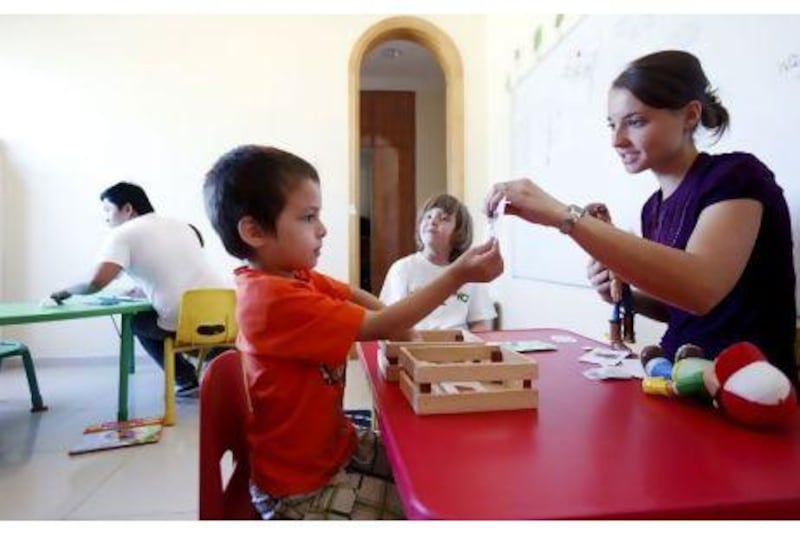A United Nations resolution calling on governments to improve access to care for people with developmental disorders has experts in the UAE hopeful of significant reform.
The resolution, passed last week, calls for urgent action to make long-term health care, education, training and intervention programmes available.
The UAE, Qatar and Saudi Arabia were among more than 70 co-sponsors.
"It's a very positive step that should have taken place even earlier," said Dr Omniyat Al Hajri, director of public health and research at the Health Authority - Abu Dhabi (Haad). "It's important this is officially addressed because not only do children suffer, but also their families and the community."
There are about 2,400 autistic children in Abu Dhabi and 7,000 across the UAE, according to estimates provided by Haad from a 2009 report by the New England Centre for Children. Of those, 1,400 are at an age where early intervention would be useful.
But Dr Al Hajri said the estimates were conservative, based on previous international prevalence rates of the condition that state it affects between 1 in 150 and 1 in 200 children.
Experts estimate that the rate follows the US at one in 88. The higher rate is attributed to a number of factors, including better detection and broadening the definition of the disorder.
Early diagnosis is key to any successful programme, Dr Al Hajri said, and those whose conditions were detected and treated early had a good chance of functioning almost normally.
Last month, Haad implemented the Well Child Visits standard, which gives all children in the emirate access to free health screenings and check-ups until the age of 6.
This include tests for autism and other developmental disorders at 18 months and 24 months, in line with recommendations set by the American Academy of Paediatrics.
Emirati children have free access through Thiqa. Expatriates can use the service at any Seha facility.
Children with problems are referred to the New England Centre for Children, which carries out further assessments and presents the family with options for treatment.
Acknowledging that most public centres were already at capacity and the costly rates charged by private centres, Dr Al Hajri said the data collected through this standard could help foster change.
"Now we have achieved a uniform method of making an early diagnosis," she said. "We do have an internal mechanism of advocating accessibility, but we need the data to support it."
The UAE is not alone in facing a lack of resources and high costs for the services that are available.
"In the UAE and many other countries, there may be some form of public support but it is often inconsistent and uncoordinated," said Dr Andy Shih, the vice president of scientific affairs at Autism Speaks, an autism science and advocacy group that has largely supported the resolution. "What this resolution does is encourage all UN agencies to be proactive all around the world.
"It provides the legal framework to help organise and coordinate structured programmes."
Although the resolution is not legally binding, it does provide guidelines and recommend activities for improving care in the country.
One of the key challenges facing the UAE is the lack of manpower, which has experts unsettled given the increasing prevalence.
"At this rate, it wouldn't be surprising if after five years it stood at one in every 50 or 45 children," said Dr Hibah Shata, the co-founder of the Child Early Intervention Medical Centre and the Child Learning and Enrichment Medical Centre.
"The question is, what are the existing methods we have in the UAE to cope with this? We don't have the local specialists."
Dr Amal Ahmed Al Shamlan, the head of rehabilitation at the Dubai Health Authority's Latifa Hospital, said the limited number of qualified professionals affected the quality of care. The department receives between 60 and 70 outpatients a day, and limited resources often mean waits can be long.
"We have a qualified psychologist who does behaviour analysis using her own approach, but not specifically [applied behaviour analysis]," she said. "There are a limited number of specialised psychologists, speech therapists and we need time to schedule patients. It is a challenge not only here at this hospital, but also outside."
A national action plan that covers a country uniformly works best, Dr Shih said. "Several countries in Europe and South Asia are progressive in this area of developing a national action plan on autism," Dr Shih said. "Clearly, that's the direction we need to go to benefit the families in the most comprehensive way."
The Ministry of Health was not available for comment.





